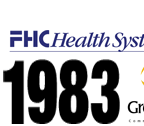 |
|
 |
 |
 |
 |
|
 |
 |
 |
 |
|
 |
 |
 |
| |
|
|
|
|
|
FHC Health Systems Acquires Interest in Innovative Internet Service Offering Instant Online Medical Data... We'd like to welcome STA)STAT to our FHC family of companies! In early February 1999, FHC acquired controlling interest in STA)STAT, a division of American Medical Services, L.L.C. STA)STAT (pronounced Stay-stat) is an emergency medical information service which, through a unique personally managed medical record system, provides patient data instantly to medical personnel via the Internet, phone, or fax. This global service aids members no matter where they are or whether or not they can respond to inquiries from medical professionals. STA)STAT is but one of the many innovative companies under the FHC umbrella. In fact, who could have predicted when Ronald I. Dozoretz, M.D. founded First Hospital Corporation in 1983 that in just 15 short years FHC Health Systems would be one of the country's top behavioral health organizations? This phenomenal success was built one triumph at a time, with the expertise drawn from years of experience and successful enterprises under Dr. Dozoretz' leadership. In creating First Hospital Corporation, Dr. Dozoretz envisioned a company that would deliver a wide range of innovative, high-quality, cost-effective behavioral health services to families and their communities. FHC began by offering these services through behavioral health and substance abuse facilities across the United States and in Puerto Rico. To market the resulting FHC facilities, Dr. Dozoretz and several colleagues developed Group III Communications, Inc. in 1983, which over the years has broadened its client base to encompass a wide range of general, service-oriented, and business-to-business fields. Over time, the inpatient facilities have been sold, converted into residential treatment facilities, or moved under Alternative Behavioral Services. "In 1986 Dr. Dozoretz envisioned how managed care would impact inpatient utilization. He moved quickly to hire staff who would lead us into the divisions now known as ValueOptions and Alternative Behavioral Services," notes Ed Irby, Executive Vice President of Administration and Operations, FHC Health Systems, and Chief Executive Officer, Alternative Behavioral Services. Group III Communications has a dynamic 15-year history producing innovative, effective communications for a variety of clients. Originally formed to service First Hospital Corporation, the agency's expertise has broadened to encompass a wide range of general, service-oriented, and business-to-business fields. Group III's staff has grown from a three-member team to a group of over twenty knowledgeable, creative and experienced professionals. ValueOptions - To contain the rapidly rising cost of behavioral health services and to improve the access and quality of care for patients, Dr. Dozoretz created a managed behavioral health company, FHC Options, Inc. In 1989, OPTIONS' first contract included 250,000 CHAMPUS military beneficiaries in Tidewater, Virginia. Today, now known as ValueOptions, the company has grown to 3,000 employees serving over 20 million lives, with 900 clients. The much-lauded company has earned a string of honors; ValueOptions consistently receives high satisfaction ratings from clients, members and providers alike. Alternative Behavioral Services (ABS) was created to provide innovative services and programs to better serve children, adolescents, and their families. Although announced to the public as ABS in 1994, the first ABS program actually began in 1986 with an inpatient residential juvenile sex offender program at the Dozoretz-owned and operated Portsmouth Psychiatric Center in Virginia. In the fall of 1986, ABS purchased a 30-acre campus, named it The Pines Residential Treatment Center, and expanded services to include a program for violent and aggressive youth. Today, ABS serves youth ages 5 to 22 years through residential treatment centers, youth detention centers, psychiatric hospitals, group homes, therapeutic foster care family settings, alternative schools, outpatient provider offices, and in client homes. ABS continues to grow in anticipation of the changing needs of today's families and communities. FirstLab joined the FHC family in 1988. This drug and alcohol testing company with nearly 30 employees custom designs, implements, and manages programs worldwide for 1000 national and international clients, including Fortune 500 companies, transportation services, law enforcement agencies, and professional sports organizations. FirstLab is a comprehensive alcohol and drug-free workplace service offering a complete approach to program administration, which often provides substantial savings in personnel costs. FirstLab is a natural outgrowth of FHC's commitment to helping employers provide safe workplaces and programs that their employees need to succeed. RX Innovations (RxI) was created in response to the rising costs of medications experienced when OPTIONS took risk on pharmacy services in Puerto Rico. RxI was then launched as a stand-alone company in October 1997. RxI's focus is in managing specialty medications including behavioral health, cardiology and other high risk medications. RxI's pharmacy benefits management services can be provided to Medicaid agencies, state employee plans, HMOs, Community Mental Health Centers and anyone at risk for medications. Through its integrated product, RxI and ValueOptions provide behavioral health prescription management services to customers like the Regional Behavioral Health Initiative in Maricopa County and BHI and BBHC in Kentucky. RxI also began providing pharmacy benefit for all FHC employees in January. TrialStar head quartered in Nashville, Tennessee, was launched in late 1998 and is one of FHC's newest divisions. This exciting endeavor will capitalize on FHC's clinical and management expertise to contract with pharmaceutical companies for the management of clinical trials for medications, biotechnology and medical devices under development. TrialStar will allow FHC to take a leadership role in helping develop new medications that will benefit patients far into the future. |
